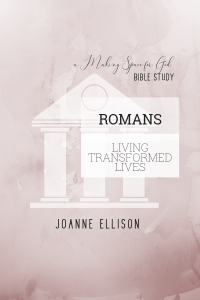 Good afternoon, Drawing Near to God Community! Today was a great day as we kicked off our study of Romans with an introduction to this book, which is sometimes referred to as the Biblical Himalayas. Intimidating, right? You may feel like you’re drinking from a firehose (see this funny video that I showed in my teaching) but know that we are in this journey together and will be digesting it week by week for the next 13 weeks. If you haven’t signed up yet, it’s never too late to join – you can join us live or via streaming (more information here).
Good afternoon, Drawing Near to God Community! Today was a great day as we kicked off our study of Romans with an introduction to this book, which is sometimes referred to as the Biblical Himalayas. Intimidating, right? You may feel like you’re drinking from a firehose (see this funny video that I showed in my teaching) but know that we are in this journey together and will be digesting it week by week for the next 13 weeks. If you haven’t signed up yet, it’s never too late to join – you can join us live or via streaming (more information here).
For those that are new to our community, I often share my teaching notes on Thursdays here on the blog so that those of you who can’t be with us in person can get a sense of what we’re studying and those that are with us can refer back to my notes as a recap.
Today, we discussed some ways to study this semester, including: 
- Interpret the passage as the author intended it to be understood. (ie- historical setting)
- Consider the impact of the message on the immediate audience
- Look for the application for the modern audience
All throughout this study, we’re going to be looking at a red thread woven throughout Romans: the power of the Gospel. So let’s look at a definition of the Gospel:
Gospel/good news–
- With roots in Isaiah it meant the news of Yahweh’s long awaited victory over evil, rescuing His people.
- For Jesus and Paul, the announcement of God’s in-breaking kingdom was the “good news” that God’s people had been waiting for.
And here are some other definitions of terms that will be used in this course, so you can refer back here as we go:
 Grace
Grace
- Unmerited favor; getting what we don’t deserve. God’s riches at Christ’s expense
Justification
- A legal term indicating God’s declaration, from his position as judge of all the world, that someone is in the right despite universal sin because Jesus dealt with sin on the cross
Righteousness
- The perfect holiness of Christ. It is an essential attribute to the character of God; quite literally meaning “One who is right”. Think of it as the polar opposite of sin.
Faith
- Accepting certain things as true about God and what He has done in the World.
Salvation
- Deliverance from the power and penalty of sin; redemption.
Election
- Unconditional election whereby God choses us and it does not depend on a person’s performance.
We also talked about some information about the book of Romans, so we have some context – the who, what, when, why, etc….
Who wrote it?
Romans claims to be written by Paul (see 1:1) or more accurately composed by Paul and written down by a scribe (amanuensis).
To whom is was written:
Christians in Rome.
Where:
Paul’s reference to Cenchrea in 16:1 suggests he is staying in Corinth at the time for Cenchrea was the seaport next to Corinth.
When?
Ad 57 (around)
Why?
Themes
- Justification by faith
- Resolution of conflict between Jew and Gentile believers and more specifically Gentile inclusion
- Paul’s missionary goals
- Transformed thinking
- Living in the power of the Spirit
- Offering Lives as a spiritual sacrifice
I hope this is helpful to you as you embark on this journey through Romans with me. Stick with me – it’s going to be an amazing 13 weeks as we learn about God’s love for us and destiny for our lives!
